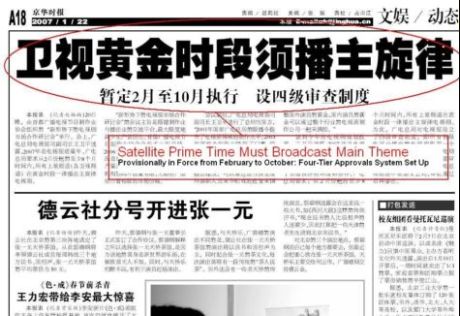Chinese broadcast officials announced over the weekend that only television dramas cleaving to the Party’s “main theme” would air during prime time this year. The measure, announced under the banner of China’s self-proclaimed “Year of Quality Television Dramas”, masks a campaign to keep threatening content out of prime-time television during what Party leaders regard as an especially sensitive year, marking the 50-year anniversary of the Anti-Rightist Movement and the start of the crucial 17th Party Congress. [Below: Headline in Jinghua Times announces the new SARFT regulations].

The language “carry forward the main theme” (弘扬主旋律) is an unambiguous Communist Party buzzword, encapsulating the notions of Party control, the supremacy of Marxism, the central position of heroic Party figures, and other key concepts, in an analogy to orchestral music. In recent years, the idea of the “main theme” has persisted as a term of some importance in China, complemented under commercialization with the notion of “promoting pluralism”. In television programming, the marriage of the two concepts suggests a CCP-style political correctness enlivened with themes more relevant to viewers — love stories, emotional turmoil, etc.
During a January 20 meeting, top leaders from the State Administration of Radio Film and Television (SARFT) announced that “beginning next month and for a period lasting at least eight months” — stretching through the Party Congress in October — satellite television stations in China would “without exception” broadcast “main theme television dramas” (主旋律电视剧).[Coverage from Jinghua Times via Sina.com].
Characterizing the new regulations as an effort to emphasize quality over quantity, SARFT officials said a 2003 relaxation of restrictions on television production had brought a flood of low-quality content into the industry. “This is a special year for all television programming,” said SARFT Deputy Director Wang Weiping (王卫平), quoted in Jinghua Times today. “In order to create good conditions and a favorable environment, SARFT declares that: from February and lasting for a period of eight months, all satellite channels will without exception broadcast main theme television dramas”.
Wang said SARFT had established a four-tier inspection and approval system for television dramas, in which they would first be submitted to the provincial office of SARFT and from there go to provincial propaganda authorities, the national SARFT office and finally to the Central Propaganda Department.
The move drew scorn and sarcasm from Chinese Web users.
“What is main theme television?” one user asked on the popular Chinese Web portal Sina.com. “Is it singing the praises of officials and their achievements? Or is it about things relevant to people’s lives, getting rid of corruption, fighting dirty power?”
Another Web user pointedly suggested China should share its policies with the world: “Shouldn’t we have the United Nations issue a decision: We cannot let Chinese people enjoy this happy [policy] on their own — the whole world must broadcast China’s main theme television? That would make it really fantastic!”
Many users hearkened back to the Leftist propaganda classics of the Cultural Revolution, suggesting bitingly that there was no reason for new productions if these were available: “It’s good enough just to re-air the eight exemplary plays [of the Cultural Revolution]. That’ll be flavorful enough. Why film new television dramas? I agree [with this policy].” And: “I support the State Administration of Radio Film and Television! It’s enough if we just film a few exemplary films each year. That way we won’t need to spend so much money!”
In a country where the popularity of video file-sharing has taken off in recent months, another Web user gave a verbal shrug, suggesting everyone should scrap their televisions and go with online broadcasts: “I’d like to ask — do I have the right during prime time to not, not, not to watch TV? I’d like to ask — the ‘main theme’ television you are talking about, if it is ‘main’, why doesn’t it have the guts to compete on level ground with other TV programs, but instead has to make use of monopoly power? …You guys go ahead with your making of regulations and carrying them out — you have a monopoly after all! As for myself, my prime time comes a bit later. It’s not affected. Ha ha! … From now on, those who set up new homes shouldn’t bother buying televisions. If you have a computer, there no sense in having a TV”.
[Posted by David Bandurski, January 22, 2007, 4:21pm]




















